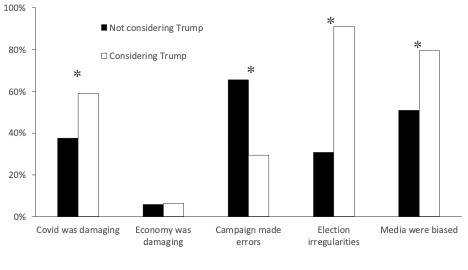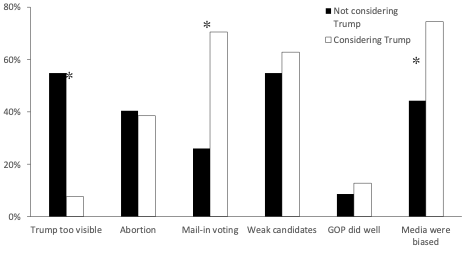What do Republicans tell themselves about why the last few election cycles came out as they did? More importantly, how do those narratives differ within the party?
In my February survey of Republican county chairs (see more about that survey here), I asked why people thought the 2020 presidential election came out as it did. I offered several possible explanations, and allowed respondents to pick as many as they thought were accurate. These options were:
The Covid pandemic created a difficult environment for Donald Trump’s reelection campaign.
The economy created a difficult environment for Donald Trump’s reelection campaign.
Donald Trump and/or his campaign made mistakes that cost him votes.
There were election irregularities.
The media were biased against Donald Trump.
(Importantly, I did not provide an option that Trump actually won the election. My assumption was that the bulk of those taking this position went with the option that there were “election irregularities.”)
I broke the responses to this question down by candidate support. As I noted in a previous post, roughly 43 percent of the chairs I spoke to said they were considering supporting Donald Trump for a third presidential nomination, while most of the rest were strongly opposed to his bid. I divide up the data this way, by those interested in Trump and those not. The results can be seen in the figure below.
There were substantial and statistically significant differences between the Trump-interested and others for all the narratives except the economic argument, which saw little support from anyone. (The statistically significant differences are marked with an asterisk.) Unsurprisingly, the Trump-interested were far more likely to endorse the narratives exonerating Trump from wrongdoing in 2020 – that the media were biased against him (79-51), that there were election irregularities (91-31), and that the pandemic hurt him (59-38) – while they were less likely to endorse the idea that Trump’s team made errors (29-65). About 15 percent said something else.
I similarly asked respondents about a range of possible narratives for Republican under-performance in the 2022 midterm election outcomes. These options were:
Donald Trump was too visible and active in the election cycle.
The focus on abortion generated a lot of Democratic turnout.
Democrats were able to use early and mail-in voting to gain an unfair advantage in the election.
Republicans recruited weak candidates in some competitive races.
Republicans actually did quite well in the midterm elections.
The media were biased against Republicans.
As before, respondents could endorse as many of these narratives as they liked.
Again, unsurprisingly, there were substantial and statistically significant differences between respondents based on their interest in Trump, and the Trump-interested were far more likely to endorse those narratives that exonerated Trump. The Trump-interested were more likely to favor the narratives about media bias (74-44) and mail-in voting (71-26), but less likely to endorse the narrative that the election outcome was Trump’s fault (8-55). Abortion was mentioned by roughly 40 percent of respondents with almost no difference between the Trump-interested and others. Only around 10 percent thought the GOP actually did well, with little distinctions by candidate support.
Curiously, 63% of the Trump-interested thought that Republican candidates were poor, and 55% of others agreed. This difference was not statistically significant, which is somewhat surprising given that the narrative at least partially implicates Trump due to his outsized role in recruiting and backing nominees.
I tend to view these narrative constructions as important, as they are how a party decides why it lost the last election and how to prepare for next one. And what they suggest for now is a party that basically agrees that it is doing poorly and nothing else. The Republican Party has in no way made up its mind about why it has underperformed in recent elections or what to do about it. Which makes coordinating on a candidate for the next contest all the harder.








Of course the GOP God-King could never do anything wrong or even make a mistake.
Other than on abortion, it's amazing how little they think that voters being repelled by their platform had anything to do with it.